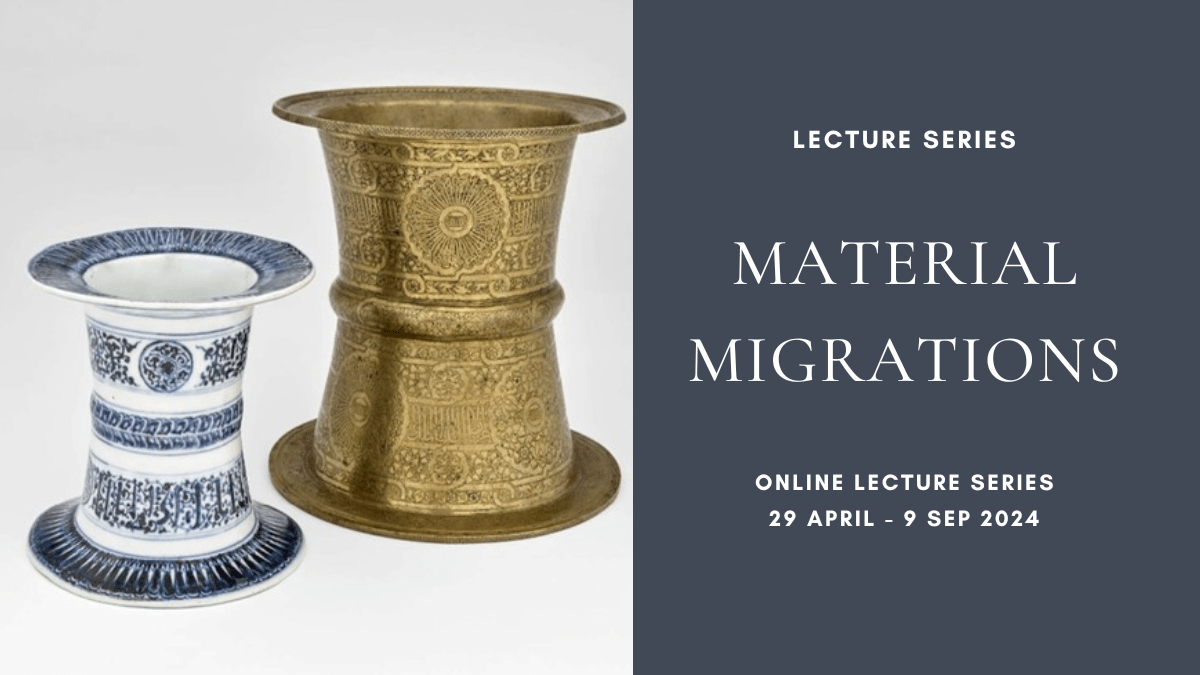The “Material Migrations” lecture series centers issues of object mobility, transcultural dynamics, and notions of connectivity and resistance with case studies from the Middle Ages until today. Connected to the international collaborative research project “Material Migrations: Mamluk Metalwork across Afro-Eurasia”, funded by the Gerda Henkel Foundation and directed by Gertrude Aba Mansah Eyifa-Dzidzienyo and Vera-Simone Schulz, the online lecture series sheds new light on the lives and afterlives of objects, but also counterbalances an object-centered with a people-centered approach. Interdisciplinary in nature, the series brings together researchers and cultural practitioners from different institutions across the globe, fostering nuanced analyses that transcend traditional disciplinary boundaries. Through engagement with art history, history, archaeology, anthropology, literary studies, and contemporary art, the lectures offer innovative perspectives on questions of canonization and the overcoming of canons, on visual and material culture, critical museology, critical heritage studies, preservation, conservation, and questions of care. The first round of talks and conversations this year will focus on Afro-Eurasian and global dynamics, on Durbi Takusheyi as a hub for people and objects crisscrossing the African continent, on objects and materials in relation to sites and the environment, on the present and future of heritage sites and museums, on contemporary approaches to Black presence in the Uffizi galleries, and on present pasts in the medium of film. Illuminating the interconnectedness of human experiences and material artifacts, “Material Migrations” highlights their enduring significance in contemporary contexts.
The ongoing lecture series is free, online and open to the public. Everyone is welcome to register and attend. A follow-up program will be published in the coming months.
For more information on the “Material Migrations” project, please visit our website.
Lecture Series Program
Monday, April 29, 5pm CET
Albrecht Fuess (Philipps-Universität Marburg): A Clash between Muslim Empires: The Struggle between Ottomans, Mamluks and Safavids in the Years 1470-1520
Registration link | More information
Monday, May 20, 5pm CET
Akanni Olusegun Opadeji (MOWAA): New Light on Durbi Takusheyi and the Katsina Excavations
Monday, May 27, 5pm CET
Mark Seyram Amenyo-Xa (University of Ghana): The Forts and Castles of Ghana: 4+ Decades of World Heritage Status
Registration link
Monday, June 24, 5pm CET
Musa Oluwaseyi Hambolu (University of Jos, former Director of Research, NCMM Nigeria): The Present and Future of Museums in Nigeria
Registration link
Monday, July 1, 5pm CET
Jenny Bulstrode (University College London): The Cogs and the Wheels in the Webs of Resistance
Registration link
Monday, July 15, 5pm CET
Justin Randolph Thompson (The Recovery Plan): The Limitations of Presence: Contested Framings of Access
Registration link
Monday, September 9, 5pm CET
Elizabeth Lambourn (De Montfort University): Metals and Models: The Exchange of Technologies between Aden and the Malabar Coast as Recorded in Geniza Documents
Registration link
This first round of the online series will also include a virtual screening of:
“Il Moro”, the Oscar longlisted film on the life of the Duke of Florence Alessandro de’ Medici of African descent followed by a discussion with the film director Daphne Di Cinto.
Information on how to register for this event will be made available on the Gerda Henkel website.
Concept and organization: Gertrude Aba Mansah Eyifa-Dzidzienyo and Vera-Simone Schulz
